Share
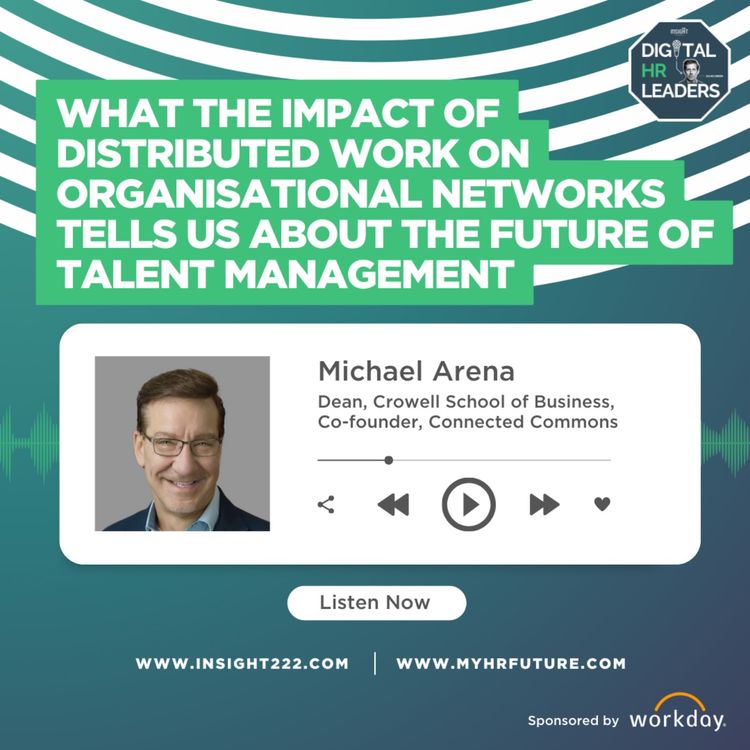
Digital HR Leaders with David Green
What the Impact of Distributed Work on Organisational Networks Tells Us About the Future of Talent Management (an Interview with Michael Arena)
How is the shift to hybrid and distributed work reshaping the very fabric of your organisation’s networks? And how you can leverage these changes to build more effective teams and drive business success?
In this episode of the Digital HR Leaders podcast, David Green is joined by Michael Arena, a pioneer in Organisational Network Analysis (ONA), to explore how networks have evolved since the height of the pandemic.
Listen in as they explore:
- How organisational networks have evolved in a distributed work environment
- Key findings from Michael’s research on optimal team size
- How HR leaders can implement network analysis insights to drive strategic action
- The role of AI in facilitating ONA and the future of network research
This episode, sponsored by Workday, is essential listening for HR leaders looking to optimise team dynamics and embrace the power of organisational networks to thrive in today’s world of work.
Workday is a leading provider of enterprise cloud applications for HR and finance, recognised as a leader in the Gartner Magic Quadrant for Cloud HCM Suites.
Organisations ranging from medium-sized businesses to more than 50% of the Fortune 500— including Netflix, Sanofi, AstraZeneca, and Rolls Royce—have chosen Workday to build their HR systems and implement Workforce Analytics solutions. Join them and learn more at workday.com
Links to Resources:
- Michael Arena on LinkedIn: Michael Arena
- Workday: Workday
- MyHRFuture Academy: MyHRFuture
- Insight222: Insight222
More episodes
View all episodes
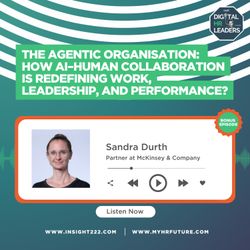
The Agentic Organisation: How AI–Human Collaboration Is Redefining Work, Leadership, and Performance.
41:42||Season 51As we begin a new year, it’s natural to reflect on what’s changed - and what’s quietly no longer fit for purpose. AI investment is accelerating at pace, and autonomous and semi-autonomous agents are moving from experimentation to everyday work. And yet, many organisations are still operating with leadership models, workforce structures, and planning assumptions designed for a world where humans were the only actors in the system. In this episode of the Digital HR Leaders podcast, David Green is joined by Sandra Durth, Partner at McKinsey & Company, to explore what happens when work is no longer just human-to-human, but human-to-agent - and what that means for the future of organisations. Drawing on McKinsey’s latest research, Sandra shares her perspective on: How AI-human symbiosis is reshaping the very definition of work Why traditional hierarchies and leadership models are starting to break down What “agentic leadership” really looks like in practice The implications for performance, management capability, and strategic workforce planning The biggest opportunities - and the biggest risks - HR leaders need to be paying attention to right now Links to research: The agentic organization: Contours of the next paradigm for the AI era Six shifts to build the agentic organization of the future Rethink management and talent for agentic AI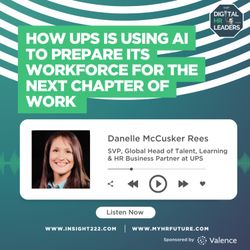
255. How UPS Is Using AI to Prepare Its Workforce for the Next Chapter of Work
42:38||Season 51, Ep. 255Can AI fuel a people-first transformation at global scale? At UPS, the answer is a resounding yes. While many companies view AI through the lens of automation and efficiency, UPS is taking a radically different approach: treating AI as an enabler of human growth, not a replacement for it. In this episode of the Digital HR Leaders podcast, host David Green is joined by Danelle McCusker, Senior Vice President and Global Head of Talent, Learning and Culture at UPS, to explore how the company is redefining what workforce transformation looks like in the age of AI. With over half a million employees and a deeply rooted culture of promotion from within, UPS faces a unique challenge: how to prepare its people for a future defined by emerging technologies - while preserving trust, purpose, and opportunity. Join them as Danelle and David explore: Why UPS is designing AI implementations to relieve frontline burdens and elevate the value of human work - not eliminate it. How a pilot with Valence’s AI coach Nadia is creating access to consistent, personalised development for employees well beyond the executive tier. The role of psychological safety and experimentation in successful AI adoption How HR and technology teams are partnering to drive cultural and capability transformation What other HR leaders can learn from UPS’s intentional, business-first approach to AI Whether you're in the early stages of your AI journey or looking for practical ways to align tech with talent strategy, this conversation offers both inspiration and actionable insights from the front lines of change. This episode is sponsored by Valence. Imagine if every employee had a world-class coach in their pocket. That’s exactly what Valence has created with Nadia - the AI-powered coach helping Fortune 500 companies scale development, boost performance, and support leaders at every level. Learn more at valence.co/insight222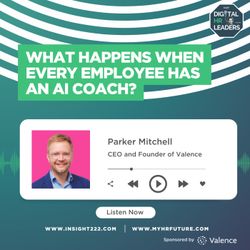
254. What Happens When Every Employee Has an AI Coach?
56:44||Season 51, Ep. 254Performance expectations are rising - but the systems designed to support people haven’t kept up. In this episode of the Digital HR Leaders Podcast, host David Green is joined by Parker Mitchell, CEO and Founder of Valence, to explore how AI is transforming the way organisations think about performance. Tune is as they explore: Why traditional performance management still feels broken How AI coaching can support real-time performance improvement at scale How trust, context, and timing make the difference in effective AI tools What changes when every employee has access to a personal coach The signals that show AI coaching is driving real performance impact How HR leaders can start small - but smart - when exploring AI coaching This episode is sponsored by Valence. Imagine if every employee had a world-class coach in their pocket. That’s exactly what Valence has created with Nadia - the AI-powered coach helping Fortune 500 companies scale development, boost performance, and support leaders at every level. Learn more at valence.co/insight222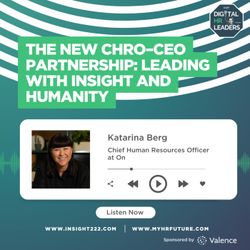
253. The New CHRO-CEO Partnership: Leading With Insight and Humanity
38:42||Season 51, Ep. 253In this episode of the Digital HR Leaders podcast, Katarina Berg - CHRO at On, former CHRO at Spotify, and author of Bold: A New Era of Strategic HR - joins David Green to explore what modern, strategic HR leadership truly requires. Together, they dive into the evolving partnership between the CHRO and CEO - a relationship that has never been more critical as organisations navigate AI, workforce transformation, culture, and business growth. Katarina shares how HR leaders can bring both insight and humanity to the executive table, shape decisions that drive business outcomes, and intentionally design a culture that empowers people to perform. The conversation covers:What a genuinely strategic CHRO-CEO relationship looks like - and how to build itHow Katarina approached her first 100 days as CHRO at On, and the lessons she’s bringing into the next phase of growthWhy “putting the H back in HR” is essential in the AI eraHow people analytics teams can evolve into true insight and decision-driving partnersWhy intentional leadership - not just tools or trends - will define the next era of HR This is a must-listen for HR leaders who want to elevate their strategic influence and lead with courage, clarity, and humanity. This episode is sponsored by Valence.Imagine if every employee had a world-class coach in their pocket. That’s exactly what Valence has created with Nadia - the AI-powered coach helping Fortune 500 companies scale development, boost performance, and support leaders at every level. Learn more at valence.co/insight222 Links referenced in the conversation:Bold: A New Era of Strategic HR2025 HR Predictions: Looking Into the Crystal Ball
252. The Science Behind High-Performing Teams
56:29||Season 51, Ep. 252Why do some teams click while others struggle, despite having top talent? That’s exactly what our host David Green explores in this episode of the Digital HR Leaders podcast, with guest Dr. Colin Fisher - PhD Programme Director at UCL School of Management and author of The Collective Edge. With a background in organisational behaviour, Colin brings a fresh lens to one of the most critical - and misunderstood - aspects of modern work: how teams are structured, and how that structure shapes everything from communication to creativity to performance. Join them and learn more about: Why the seeds of team success - or failure - are planted before Day One The 60-30-10 rule for high-performing teams (and why most leaders focus on the wrong 10%) How to design work that kills free-riding and boosts engagement Why psychological safety is a non-negotiable - and how to build it fast How AI and team design intersect, and what leaders need to do right now This episode is sponsored by Valence. Imagine if every employee had a world-class coach in their pocket. That’s exactly what Valence has created with Nadia - the AI-powered coach helping Fortune 500 companies scale development, boost performance, and support leaders at every level. Learn more at valence.co/insight222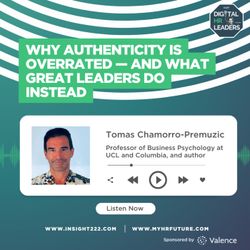
251. Why Authenticity Is Overrated - and What Great Leaders Do Instead
58:22||Season 51, Ep. 251“Be yourself.” “Bring your whole self to work.” It sounds empowering - but what if it’s actually bad advice? That’s exactly what our host David Green explores in this episode of the Digital HR Leaders podcast, with returning guest Tomas Chamorro-Premuzic - Professor of Business Psychology at UCL and Columbia, and author of Don’t Be Yourself: Why Authenticity is Overrated (and What to Do Instead). Together, they challenge popular leadership tropes and explore why being real doesn’t always lead to being effective - especially in today’s fast-changing, AI-driven world. So, join them as they explore: Why authenticity is misunderstood, and when it becomes a liability The leadership traits that actually build trust and influence How AI is transforming the employee experience The risks of eliminating early-career jobs in pursuit of productivity What inclusion really requires beyond buzzwords and optics The three ingredients every AI strategy needs to succeed This episode is sponsored by Valence. Imagine if every employee had a world-class coach in their pocket. That’s exactly what Valence has created with Nadia - the AI-powered coach helping Fortune 500 companies scale development, boost performance, and support leaders at every level. Learn more at valence.co/insight222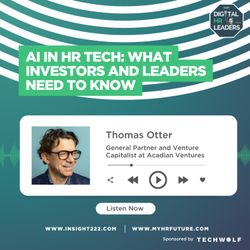
250. AI in HR Tech: What Investors and Leaders Need to Know
45:46||Season 50, Ep. 250The HR technology market is booming - but with so much innovation (and noise), how can HR leaders and investors tell what’s truly transformative from what’s just trendy? In this episode of the Digital HR Leaders Podcast, host David Green sits down with Thomas Otter, General Partner and Venture Capitalist at Acadian Ventures - a firm dedicated to investing in groundbreaking companies that make work better. With decades of experience spanning SAP, Gartner, and now venture capital, Thomas brings a rare 360-degree view of the HR tech ecosystem - from building and leading product teams to backing the next generation of innovators. Together, David and Thomas explore: Whether HR tech is going through a true transformation or simply evolving Where AI is actually making a difference, and where the hype is getting ahead of reality Why AI adoption remains slow for many organisations, and what leaders can do about it The traits and technologies that make HR tech startups stand out to investors The trends and breakthroughs shaping the next five years of HR technology and the future of work If you’re an HR or people analytics leader, tech founder, or investor looking to cut through the noise and understand where HR tech is really headed, this is a conversation you won’t want to miss. This episode is sponsored by TechWolf. TechWolf helps enterprises get fast, accurate, and actionable skills data—without surveys. From identifying the skills your workforce has to mapping what they need, TechWolf’s AI integrates seamlessly with your existing systems to turn messy data into strategic advantage. Learn more at techwolf.com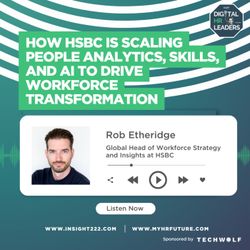
249. What Every People Analytics Leader Can Learn from HSBC’s Transformation
43:09||Season 50, Ep. 249The future of work won’t wait - and neither can your people analytics strategy. On today’s episode of the Digital HR Leaders Podcast, Rob Etheridge, Global Head of Workforce Strategy and Insights at HSBC, joins the Digital HR Leaders podcast with host David Green to reveal how the bank is building a forward-looking people analytics function - grounded in skills, AI, and trust. Join them, as they explore: The evolution of people analytics at HSBC and across the industry How to design and scale an operating model that delivers business value Why skills are a strategic priority - and how HSBC is addressing them Building governance frameworks for AI in people analytics The leadership behaviours that embed analytics into decision-making This episode is sponsored by TechWolf. TechWolf helps enterprises get fast, accurate, and actionable skills data—without surveys. From identifying the skills your workforce has to mapping what they need, TechWolf’s AI integrates seamlessly with your existing systems to turn messy data into strategic advantage. Learn more at techwolf.com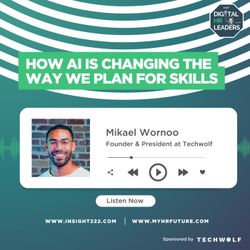
248. Is AI accelerating a skills revolution, or deepening the divide in knowledge work?
40:02||Season 50, Ep. 248In this episode of the Digital HR Leaders Podcast, host David Green is joined once again by Mikael Wornoo, Co-Founder of TechWolf - a company at the forefront of skills intelligence. Bringing fresh insights from the frontlines of AI and workforce strategy, together they explore where leading companies are heading, and what HR needs to do to stay ahead of the curve. From adoption challenges to ethical concerns, in this episode, you can expect to learn more about: How the conversation around AI and skills is shifting—and what’s driving the change Why skills-based workforce planning is becoming a business-critical priority The human side of AI: navigating adoption, mindset shifts, and ethical concerns The data and insights HR needs to lead meaningful transformation How to build a fair, skills-powered future—and avoid a “winner-takes-all” dynamic This episode is sponsored by TechWolf. TechWolf helps enterprises get fast, accurate, and actionable skills data—without surveys. From identifying the skills your workforce has to mapping what they need, TechWolf’s AI integrates seamlessly with your existing systems to turn messy data into strategic advantage. Learn more at techwolf.com